Is Alternative Dispute Resolution the Best for Planning Law Disputes?
VerifiedAdded on 2023/06/05
|5
|1312
|358
Essay
AI Summary
This essay explores the suitability of alternative dispute resolution (ADR) methods, such as mediation, in resolving urban planning law disputes. It argues that ADR offers several advantages over traditional litigation, including reduced costs, increased flexibility, faster resolution times, and the ability to maintain confidentiality. The essay highlights how mediation, in particular, allows for constructive dialogue, consideration of diverse community concerns, and the avoidance of adversarial conflict. By fostering collaboration and addressing underlying issues, ADR can lead to more satisfactory and sustainable outcomes for all parties involved in planning disputes, promoting long-term relationships and preventing further damages. The analysis supports the idea that ADR is often a preferable solution for navigating the complexities of urban planning law.
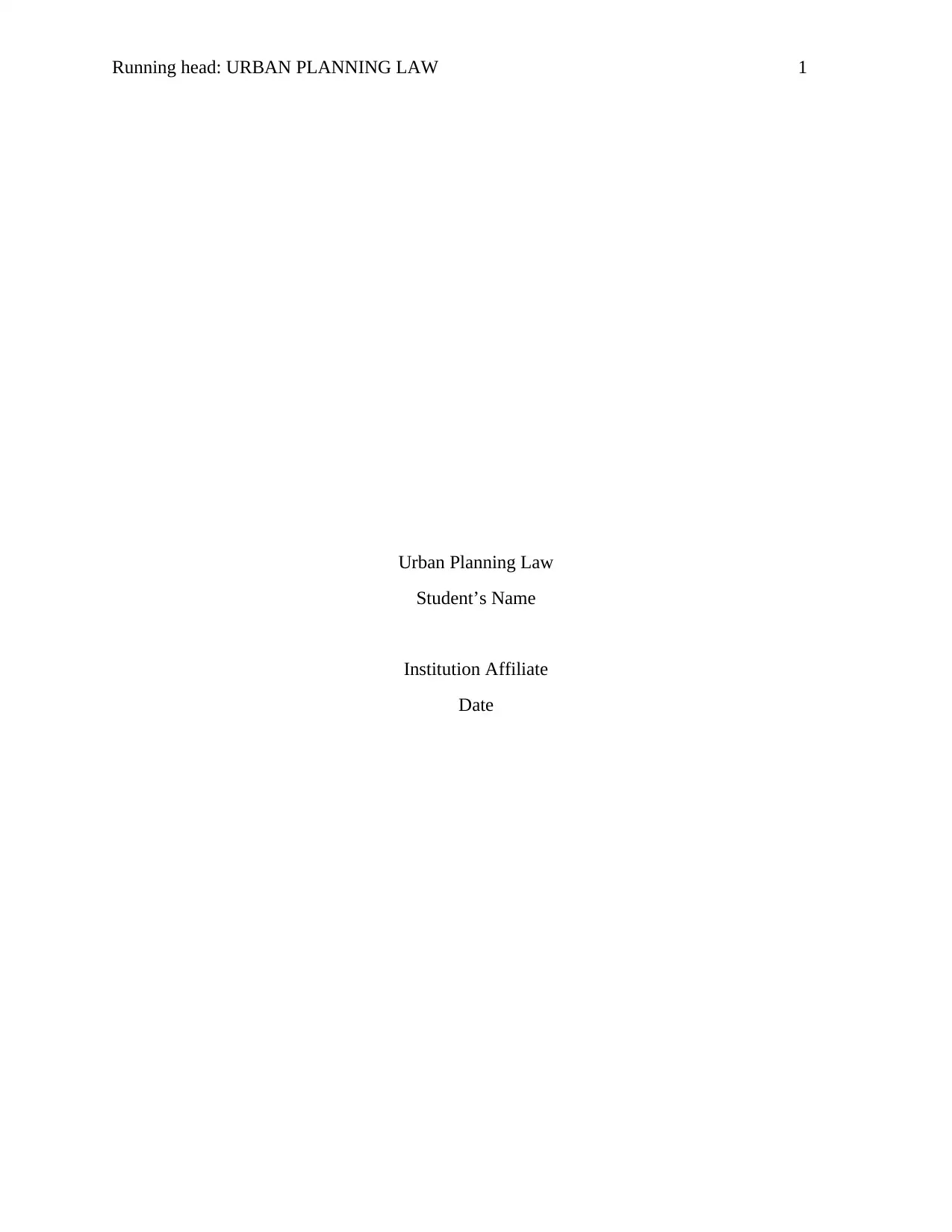
Running head: URBAN PLANNING LAW 1
Urban Planning Law
Student’s Name
Institution Affiliate
Date
Urban Planning Law
Student’s Name
Institution Affiliate
Date
Paraphrase This Document
Need a fresh take? Get an instant paraphrase of this document with our AI Paraphraser
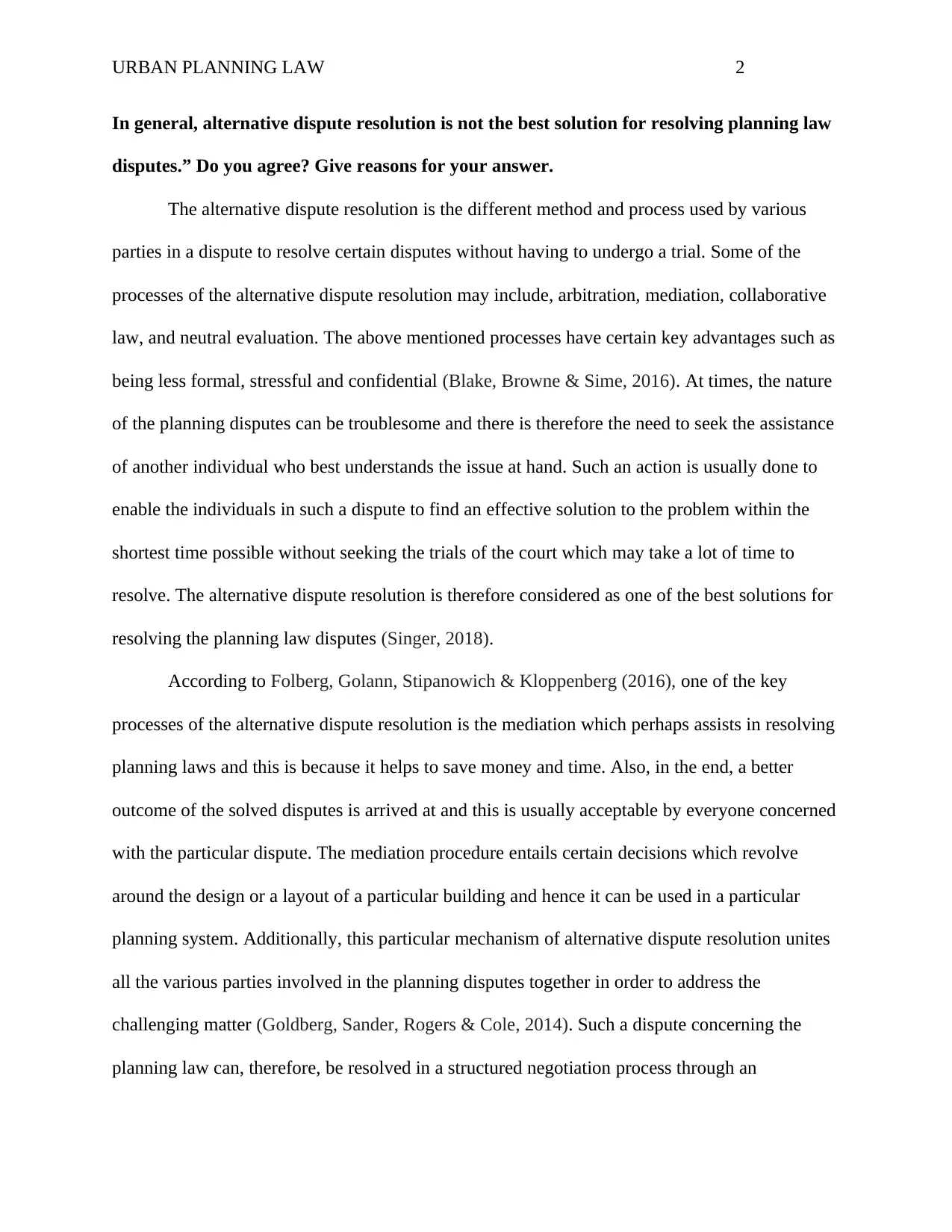
URBAN PLANNING LAW 2
In general, alternative dispute resolution is not the best solution for resolving planning law
disputes.” Do you agree? Give reasons for your answer.
The alternative dispute resolution is the different method and process used by various
parties in a dispute to resolve certain disputes without having to undergo a trial. Some of the
processes of the alternative dispute resolution may include, arbitration, mediation, collaborative
law, and neutral evaluation. The above mentioned processes have certain key advantages such as
being less formal, stressful and confidential (Blake, Browne & Sime, 2016). At times, the nature
of the planning disputes can be troublesome and there is therefore the need to seek the assistance
of another individual who best understands the issue at hand. Such an action is usually done to
enable the individuals in such a dispute to find an effective solution to the problem within the
shortest time possible without seeking the trials of the court which may take a lot of time to
resolve. The alternative dispute resolution is therefore considered as one of the best solutions for
resolving the planning law disputes (Singer, 2018).
According to Folberg, Golann, Stipanowich & Kloppenberg (2016), one of the key
processes of the alternative dispute resolution is the mediation which perhaps assists in resolving
planning laws and this is because it helps to save money and time. Also, in the end, a better
outcome of the solved disputes is arrived at and this is usually acceptable by everyone concerned
with the particular dispute. The mediation procedure entails certain decisions which revolve
around the design or a layout of a particular building and hence it can be used in a particular
planning system. Additionally, this particular mechanism of alternative dispute resolution unites
all the various parties involved in the planning disputes together in order to address the
challenging matter (Goldberg, Sander, Rogers & Cole, 2014). Such a dispute concerning the
planning law can, therefore, be resolved in a structured negotiation process through an
In general, alternative dispute resolution is not the best solution for resolving planning law
disputes.” Do you agree? Give reasons for your answer.
The alternative dispute resolution is the different method and process used by various
parties in a dispute to resolve certain disputes without having to undergo a trial. Some of the
processes of the alternative dispute resolution may include, arbitration, mediation, collaborative
law, and neutral evaluation. The above mentioned processes have certain key advantages such as
being less formal, stressful and confidential (Blake, Browne & Sime, 2016). At times, the nature
of the planning disputes can be troublesome and there is therefore the need to seek the assistance
of another individual who best understands the issue at hand. Such an action is usually done to
enable the individuals in such a dispute to find an effective solution to the problem within the
shortest time possible without seeking the trials of the court which may take a lot of time to
resolve. The alternative dispute resolution is therefore considered as one of the best solutions for
resolving the planning law disputes (Singer, 2018).
According to Folberg, Golann, Stipanowich & Kloppenberg (2016), one of the key
processes of the alternative dispute resolution is the mediation which perhaps assists in resolving
planning laws and this is because it helps to save money and time. Also, in the end, a better
outcome of the solved disputes is arrived at and this is usually acceptable by everyone concerned
with the particular dispute. The mediation procedure entails certain decisions which revolve
around the design or a layout of a particular building and hence it can be used in a particular
planning system. Additionally, this particular mechanism of alternative dispute resolution unites
all the various parties involved in the planning disputes together in order to address the
challenging matter (Goldberg, Sander, Rogers & Cole, 2014). Such a dispute concerning the
planning law can, therefore, be resolved in a structured negotiation process through an
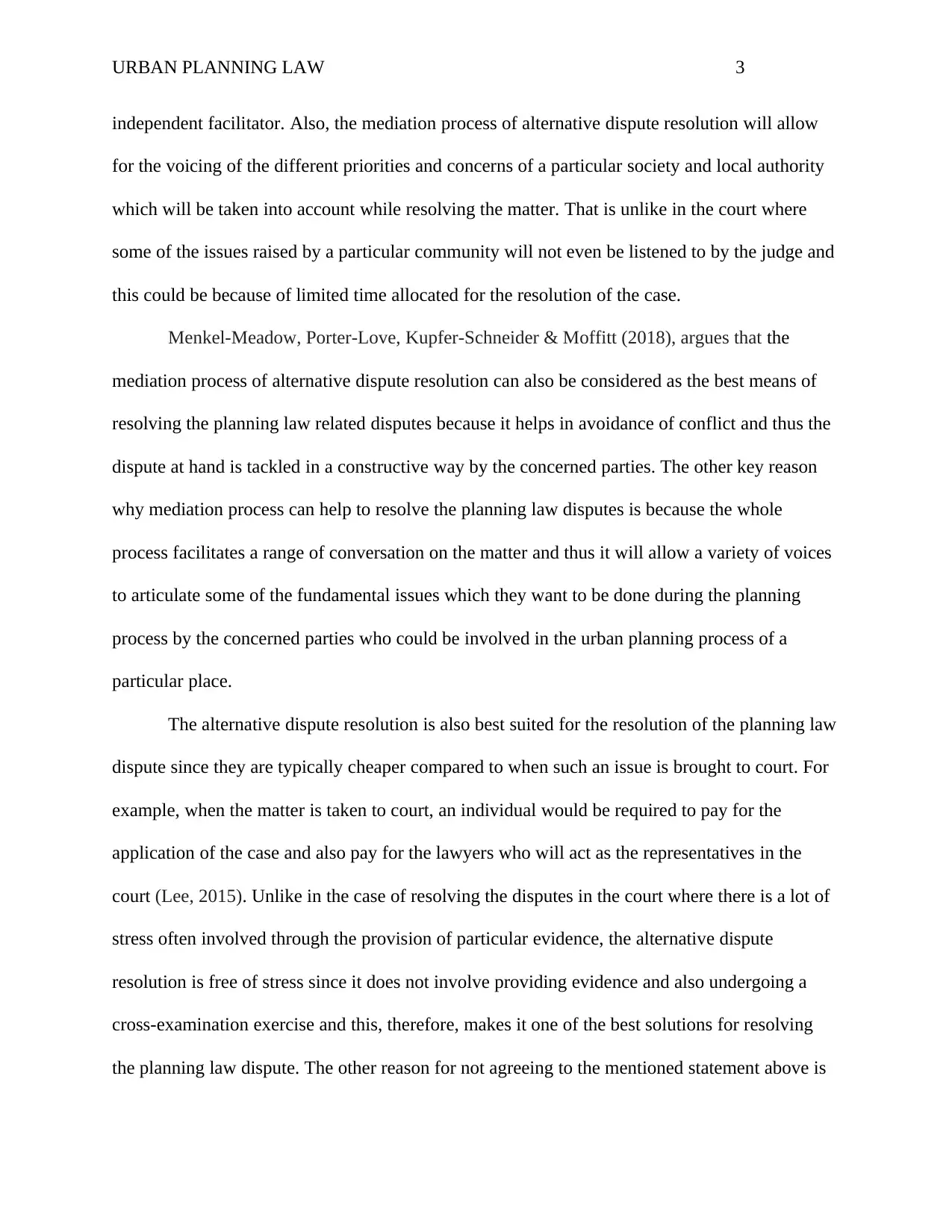
URBAN PLANNING LAW 3
independent facilitator. Also, the mediation process of alternative dispute resolution will allow
for the voicing of the different priorities and concerns of a particular society and local authority
which will be taken into account while resolving the matter. That is unlike in the court where
some of the issues raised by a particular community will not even be listened to by the judge and
this could be because of limited time allocated for the resolution of the case.
Menkel-Meadow, Porter-Love, Kupfer-Schneider & Moffitt (2018), argues that the
mediation process of alternative dispute resolution can also be considered as the best means of
resolving the planning law related disputes because it helps in avoidance of conflict and thus the
dispute at hand is tackled in a constructive way by the concerned parties. The other key reason
why mediation process can help to resolve the planning law disputes is because the whole
process facilitates a range of conversation on the matter and thus it will allow a variety of voices
to articulate some of the fundamental issues which they want to be done during the planning
process by the concerned parties who could be involved in the urban planning process of a
particular place.
The alternative dispute resolution is also best suited for the resolution of the planning law
dispute since they are typically cheaper compared to when such an issue is brought to court. For
example, when the matter is taken to court, an individual would be required to pay for the
application of the case and also pay for the lawyers who will act as the representatives in the
court (Lee, 2015). Unlike in the case of resolving the disputes in the court where there is a lot of
stress often involved through the provision of particular evidence, the alternative dispute
resolution is free of stress since it does not involve providing evidence and also undergoing a
cross-examination exercise and this, therefore, makes it one of the best solutions for resolving
the planning law dispute. The other reason for not agreeing to the mentioned statement above is
independent facilitator. Also, the mediation process of alternative dispute resolution will allow
for the voicing of the different priorities and concerns of a particular society and local authority
which will be taken into account while resolving the matter. That is unlike in the court where
some of the issues raised by a particular community will not even be listened to by the judge and
this could be because of limited time allocated for the resolution of the case.
Menkel-Meadow, Porter-Love, Kupfer-Schneider & Moffitt (2018), argues that the
mediation process of alternative dispute resolution can also be considered as the best means of
resolving the planning law related disputes because it helps in avoidance of conflict and thus the
dispute at hand is tackled in a constructive way by the concerned parties. The other key reason
why mediation process can help to resolve the planning law disputes is because the whole
process facilitates a range of conversation on the matter and thus it will allow a variety of voices
to articulate some of the fundamental issues which they want to be done during the planning
process by the concerned parties who could be involved in the urban planning process of a
particular place.
The alternative dispute resolution is also best suited for the resolution of the planning law
dispute since they are typically cheaper compared to when such an issue is brought to court. For
example, when the matter is taken to court, an individual would be required to pay for the
application of the case and also pay for the lawyers who will act as the representatives in the
court (Lee, 2015). Unlike in the case of resolving the disputes in the court where there is a lot of
stress often involved through the provision of particular evidence, the alternative dispute
resolution is free of stress since it does not involve providing evidence and also undergoing a
cross-examination exercise and this, therefore, makes it one of the best solutions for resolving
the planning law dispute. The other reason for not agreeing to the mentioned statement above is
⊘ This is a preview!⊘
Do you want full access?
Subscribe today to unlock all pages.

Trusted by 1+ million students worldwide
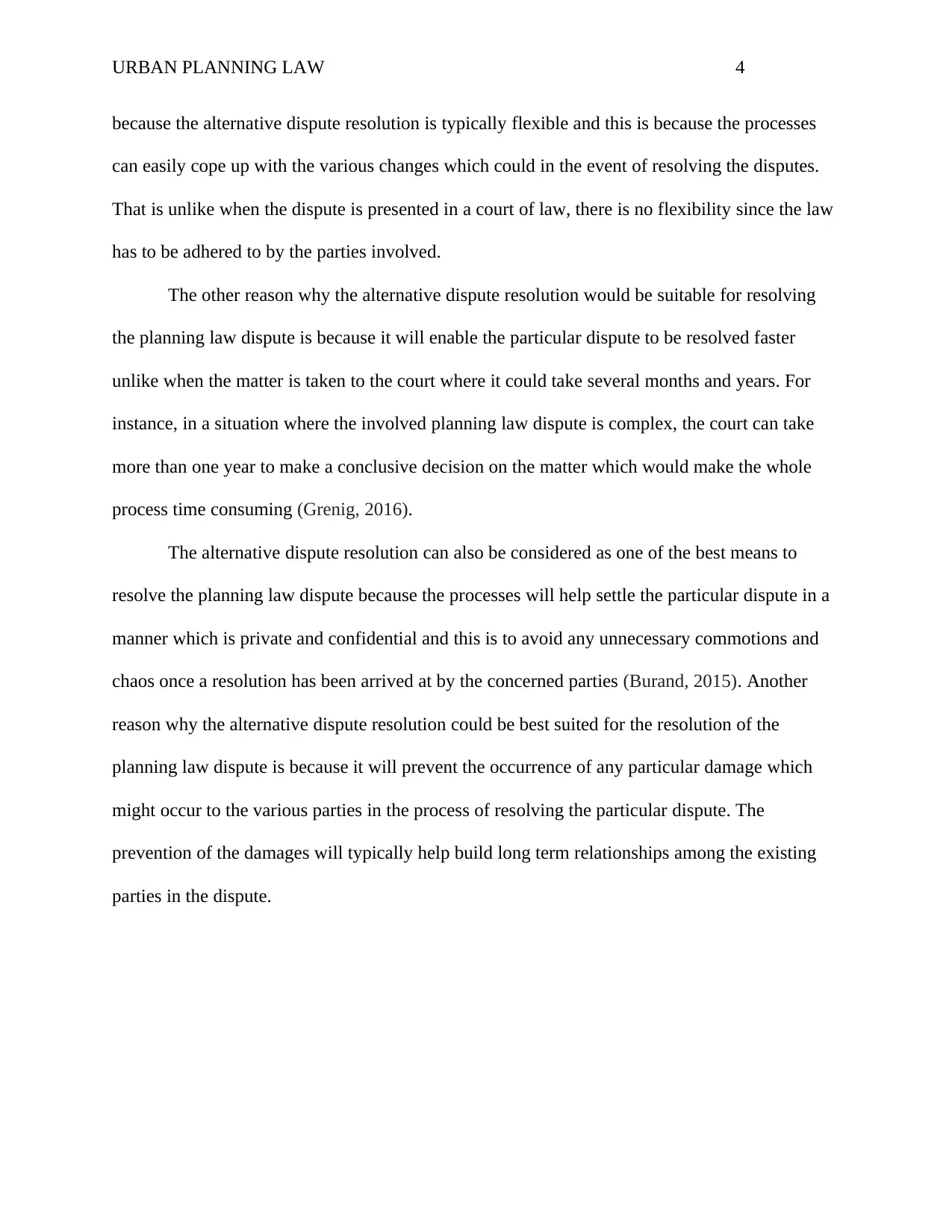
URBAN PLANNING LAW 4
because the alternative dispute resolution is typically flexible and this is because the processes
can easily cope up with the various changes which could in the event of resolving the disputes.
That is unlike when the dispute is presented in a court of law, there is no flexibility since the law
has to be adhered to by the parties involved.
The other reason why the alternative dispute resolution would be suitable for resolving
the planning law dispute is because it will enable the particular dispute to be resolved faster
unlike when the matter is taken to the court where it could take several months and years. For
instance, in a situation where the involved planning law dispute is complex, the court can take
more than one year to make a conclusive decision on the matter which would make the whole
process time consuming (Grenig, 2016).
The alternative dispute resolution can also be considered as one of the best means to
resolve the planning law dispute because the processes will help settle the particular dispute in a
manner which is private and confidential and this is to avoid any unnecessary commotions and
chaos once a resolution has been arrived at by the concerned parties (Burand, 2015). Another
reason why the alternative dispute resolution could be best suited for the resolution of the
planning law dispute is because it will prevent the occurrence of any particular damage which
might occur to the various parties in the process of resolving the particular dispute. The
prevention of the damages will typically help build long term relationships among the existing
parties in the dispute.
because the alternative dispute resolution is typically flexible and this is because the processes
can easily cope up with the various changes which could in the event of resolving the disputes.
That is unlike when the dispute is presented in a court of law, there is no flexibility since the law
has to be adhered to by the parties involved.
The other reason why the alternative dispute resolution would be suitable for resolving
the planning law dispute is because it will enable the particular dispute to be resolved faster
unlike when the matter is taken to the court where it could take several months and years. For
instance, in a situation where the involved planning law dispute is complex, the court can take
more than one year to make a conclusive decision on the matter which would make the whole
process time consuming (Grenig, 2016).
The alternative dispute resolution can also be considered as one of the best means to
resolve the planning law dispute because the processes will help settle the particular dispute in a
manner which is private and confidential and this is to avoid any unnecessary commotions and
chaos once a resolution has been arrived at by the concerned parties (Burand, 2015). Another
reason why the alternative dispute resolution could be best suited for the resolution of the
planning law dispute is because it will prevent the occurrence of any particular damage which
might occur to the various parties in the process of resolving the particular dispute. The
prevention of the damages will typically help build long term relationships among the existing
parties in the dispute.
Paraphrase This Document
Need a fresh take? Get an instant paraphrase of this document with our AI Paraphraser
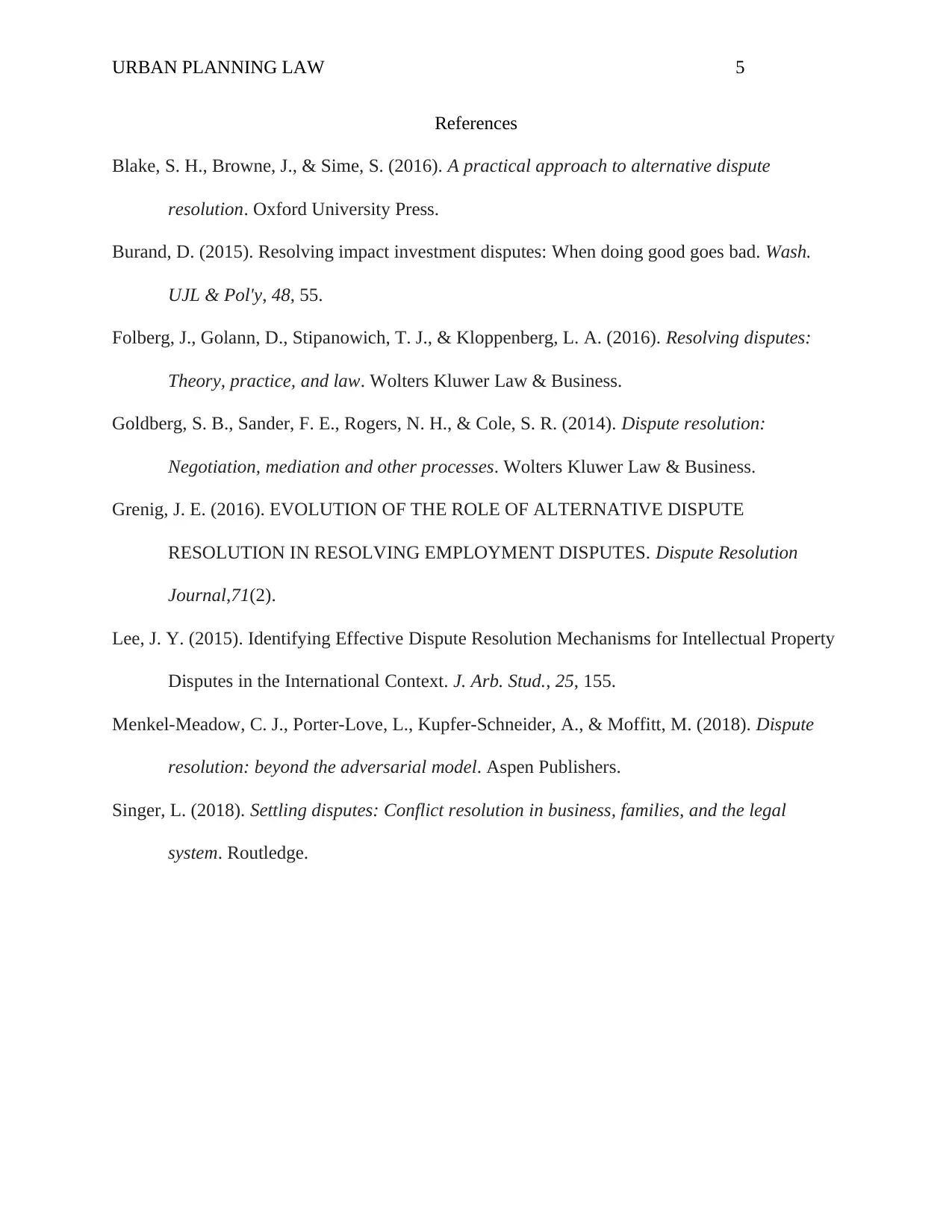
URBAN PLANNING LAW 5
References
Blake, S. H., Browne, J., & Sime, S. (2016). A practical approach to alternative dispute
resolution. Oxford University Press.
Burand, D. (2015). Resolving impact investment disputes: When doing good goes bad. Wash.
UJL & Pol'y, 48, 55.
Folberg, J., Golann, D., Stipanowich, T. J., & Kloppenberg, L. A. (2016). Resolving disputes:
Theory, practice, and law. Wolters Kluwer Law & Business.
Goldberg, S. B., Sander, F. E., Rogers, N. H., & Cole, S. R. (2014). Dispute resolution:
Negotiation, mediation and other processes. Wolters Kluwer Law & Business.
Grenig, J. E. (2016). EVOLUTION OF THE ROLE OF ALTERNATIVE DISPUTE
RESOLUTION IN RESOLVING EMPLOYMENT DISPUTES. Dispute Resolution
Journal,71(2).
Lee, J. Y. (2015). Identifying Effective Dispute Resolution Mechanisms for Intellectual Property
Disputes in the International Context. J. Arb. Stud., 25, 155.
Menkel-Meadow, C. J., Porter-Love, L., Kupfer-Schneider, A., & Moffitt, M. (2018). Dispute
resolution: beyond the adversarial model. Aspen Publishers.
Singer, L. (2018). Settling disputes: Conflict resolution in business, families, and the legal
system. Routledge.
References
Blake, S. H., Browne, J., & Sime, S. (2016). A practical approach to alternative dispute
resolution. Oxford University Press.
Burand, D. (2015). Resolving impact investment disputes: When doing good goes bad. Wash.
UJL & Pol'y, 48, 55.
Folberg, J., Golann, D., Stipanowich, T. J., & Kloppenberg, L. A. (2016). Resolving disputes:
Theory, practice, and law. Wolters Kluwer Law & Business.
Goldberg, S. B., Sander, F. E., Rogers, N. H., & Cole, S. R. (2014). Dispute resolution:
Negotiation, mediation and other processes. Wolters Kluwer Law & Business.
Grenig, J. E. (2016). EVOLUTION OF THE ROLE OF ALTERNATIVE DISPUTE
RESOLUTION IN RESOLVING EMPLOYMENT DISPUTES. Dispute Resolution
Journal,71(2).
Lee, J. Y. (2015). Identifying Effective Dispute Resolution Mechanisms for Intellectual Property
Disputes in the International Context. J. Arb. Stud., 25, 155.
Menkel-Meadow, C. J., Porter-Love, L., Kupfer-Schneider, A., & Moffitt, M. (2018). Dispute
resolution: beyond the adversarial model. Aspen Publishers.
Singer, L. (2018). Settling disputes: Conflict resolution in business, families, and the legal
system. Routledge.
1 out of 5
Related Documents
Your All-in-One AI-Powered Toolkit for Academic Success.
+13062052269
info@desklib.com
Available 24*7 on WhatsApp / Email
![[object Object]](/_next/static/media/star-bottom.7253800d.svg)
Unlock your academic potential
Copyright © 2020–2026 A2Z Services. All Rights Reserved. Developed and managed by ZUCOL.





